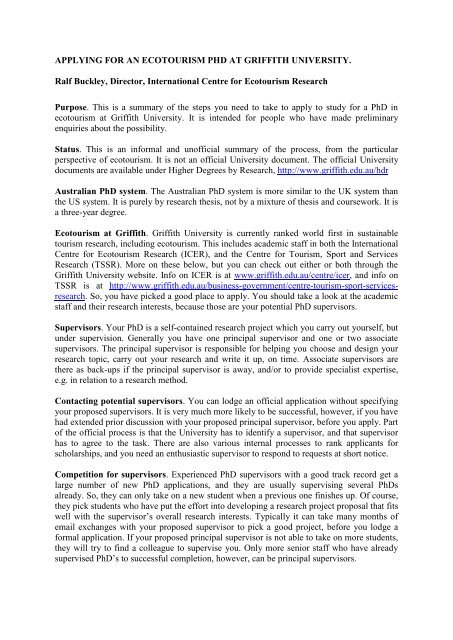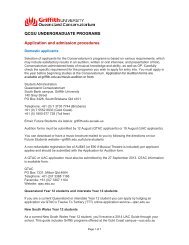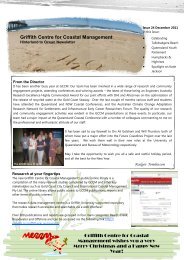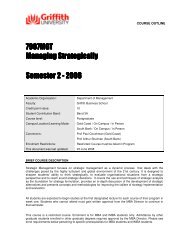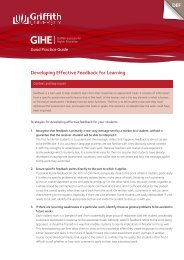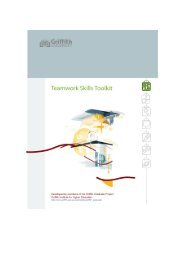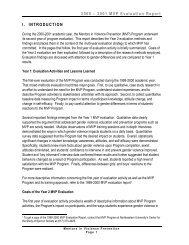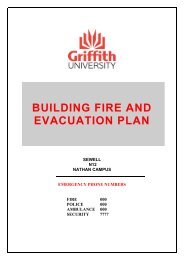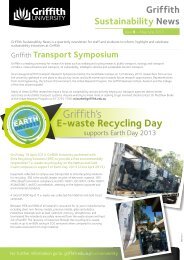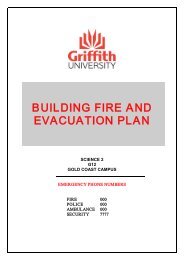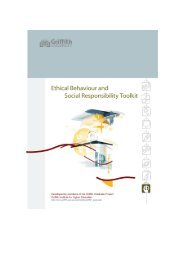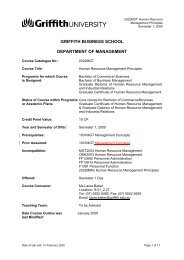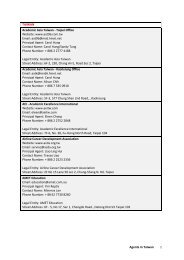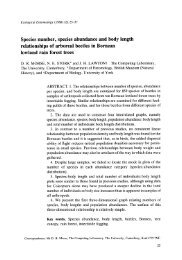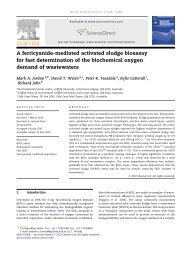Griffith PhD in Ecotourism - Griffith University
Griffith PhD in Ecotourism - Griffith University
Griffith PhD in Ecotourism - Griffith University
You also want an ePaper? Increase the reach of your titles
YUMPU automatically turns print PDFs into web optimized ePapers that Google loves.
APPLYING FOR AN ECOTOURISM PHD AT GRIFFITH UNIVERSITY.<br />
Ralf Buckley, Director, International Centre for <strong>Ecotourism</strong> Research<br />
Purpose. This is a summary of the steps you need to take to apply to study for a <strong>PhD</strong> <strong>in</strong><br />
ecotourism at <strong>Griffith</strong> <strong>University</strong>. It is <strong>in</strong>tended for people who have made prelim<strong>in</strong>ary<br />
enquiries about the possibility.<br />
Status. This is an <strong>in</strong>formal and unofficial summary of the process, from the particular<br />
perspective of ecotourism. It is not an official <strong>University</strong> document. The official <strong>University</strong><br />
documents are available under Higher Degrees by Research, http://www.griffith.edu.au/hdr<br />
Australian <strong>PhD</strong> system. The Australian <strong>PhD</strong> system is more similar to the UK system than<br />
the US system. It is purely by research thesis, not by a mixture of thesis and coursework. It is<br />
a three-year degree.<br />
<strong>Ecotourism</strong> at <strong>Griffith</strong>. <strong>Griffith</strong> <strong>University</strong> is currently ranked world first <strong>in</strong> susta<strong>in</strong>able<br />
tourism research, <strong>in</strong>clud<strong>in</strong>g ecotourism. This <strong>in</strong>cludes academic staff <strong>in</strong> both the International<br />
Centre for <strong>Ecotourism</strong> Research (ICER), and the Centre for Tourism, Sport and Services<br />
Research (TSSR). More on these below, but you can check out either or both through the<br />
<strong>Griffith</strong> <strong>University</strong> website. Info on ICER is at www.griffith.edu.au/centre/icer, and <strong>in</strong>fo on<br />
TSSR is at http://www.griffith.edu.au/bus<strong>in</strong>ess-government/centre-tourism-sport-servicesresearch.<br />
So, you have picked a good place to apply. You should take a look at the academic<br />
staff and their research <strong>in</strong>terests, because those are your potential <strong>PhD</strong> supervisors.<br />
Supervisors. Your <strong>PhD</strong> is a self-conta<strong>in</strong>ed research project which you carry out yourself, but<br />
under supervision. Generally you have one pr<strong>in</strong>cipal supervisor and one or two associate<br />
supervisors. The pr<strong>in</strong>cipal supervisor is responsible for help<strong>in</strong>g you choose and design your<br />
research topic, carry out your research and write it up, on time. Associate supervisors are<br />
there as back-ups if the pr<strong>in</strong>cipal supervisor is away, and/or to provide specialist expertise,<br />
e.g. <strong>in</strong> relation to a research method.<br />
Contact<strong>in</strong>g potential supervisors. You can lodge an official application without specify<strong>in</strong>g<br />
your proposed supervisors. It is very much more likely to be successful, however, if you have<br />
had extended prior discussion with your proposed pr<strong>in</strong>cipal supervisor, before you apply. Part<br />
of the official process is that the <strong>University</strong> has to identify a supervisor, and that supervisor<br />
has to agree to the task. There are also various <strong>in</strong>ternal processes to rank applicants for<br />
scholarships, and you need an enthusiastic supervisor to respond to requests at short notice.<br />
Competition for supervisors. Experienced <strong>PhD</strong> supervisors with a good track record get a<br />
large number of new <strong>PhD</strong> applications, and they are usually supervis<strong>in</strong>g several <strong>PhD</strong>s<br />
already. So, they can only take on a new student when a previous one f<strong>in</strong>ishes up. Of course,<br />
they pick students who have put the effort <strong>in</strong>to develop<strong>in</strong>g a research project proposal that fits<br />
well with the supervisor’s overall research <strong>in</strong>terests. Typically it can take many months of<br />
email exchanges with your proposed supervisor to pick a good project, before you lodge a<br />
formal application. If your proposed pr<strong>in</strong>cipal supervisor is not able to take on more students,<br />
they will try to f<strong>in</strong>d a colleague to supervise you. Only more senior staff who have already<br />
supervised <strong>PhD</strong>’s to successful completion, however, can be pr<strong>in</strong>cipal supervisors.
Project proposal. Your official application must <strong>in</strong>clude a one-page outl<strong>in</strong>e of your proposed<br />
research project. You can change your project, <strong>in</strong> consultation with your supervisor, once you<br />
actually get here. But you still need a good proposal to help you get accepted. If you establish<br />
good contact with your proposed supervisor, they will usually help you draft this proposal.<br />
Enrolment cf scholarships. The official application process comb<strong>in</strong>es an application for<br />
enrolment with an application for scholarships. Technically, however, these are separate<br />
issues. Enrolment means that the <strong>University</strong> is prepared to accept you to study here.<br />
Scholarships give you the money to do so. If you have your own funds, you can enrol without<br />
scholarships. The criteria for enrolment are based only on your own academic record. That is,<br />
there is a fixed threshold. Scholarships, however, are competitive. There is a fixed number of<br />
scholarships, and they go to the top-ranked applicants.<br />
Enrolment criteria. Generally, to be accepted <strong>in</strong>to our <strong>PhD</strong> programme, you must have<br />
completed either an Honours or a Masters degree which <strong>in</strong>cludes a research thesis component<br />
equivalent to at least one semester’s full time study, and where the thesis was graded (i.e. not<br />
simply pass/fail). That is the basic threshold. However, the <strong>University</strong> appreciates that there<br />
are different systems <strong>in</strong> different countries, and sometimes other evidence of research<br />
capability, such as publications or professional experience, can be used <strong>in</strong>stead. In practice<br />
this is rarely an issue, because the scholarships are a much more limit<strong>in</strong>g criterion.<br />
Language. If English is not your first language, then you have to meet language proficiency<br />
criteria before you can be accepted. If your previous qualifications, <strong>in</strong>clud<strong>in</strong>g your Honours<br />
or Masters thesis, were <strong>in</strong> English, then that may be enough. Otherwise, you generally need<br />
high marks on an IELTS or TOEFL test. English requirements can be viewed at<br />
www.griffith.edu.au/higher-degrees-research/how-to-apply/entry-requirements/<strong>in</strong>ternationalapplicants.<br />
If your previous Honours or Masters thesis is <strong>in</strong> a non-English language, then we<br />
may need a translation <strong>in</strong> order to assess your capability.<br />
Previous qualifications. In apply<strong>in</strong>g for enrolment, you have to present your previous<br />
qualifications <strong>in</strong> a way which is understandable with<strong>in</strong> the Australian system. Some European<br />
countries, for example, comb<strong>in</strong>e a Bachelors and Masters <strong>in</strong>to a s<strong>in</strong>gle extended degree.<br />
Formally this assessment is up to the HDR Student Centre, but your potential supervisor may<br />
be able to help you with presentation.<br />
<strong>University</strong> rank<strong>in</strong>gs. The Australian Government ma<strong>in</strong>ta<strong>in</strong>s a list of all universities<br />
worldwide, with equivalence rank<strong>in</strong>gs between their degrees and Australian degrees. Thus, a<br />
Masters degree from some universities <strong>in</strong> some countries may only be ranked as a Bachelor’s<br />
degree under the Australian system. This is part of the official application process, and<br />
<strong>in</strong>dividual academics can’t advise you on this. In practice, it rarely seems to be an issue.<br />
Publications. Your application will be much stronger if you already have some academic<br />
publications, but this is not essential. Your application will be judged on what you have<br />
achieved relative to age and opportunity. Dur<strong>in</strong>g your <strong>PhD</strong>, your supervisors will help you to<br />
publish journal articles from your thesis work, <strong>in</strong> parallel to submitt<strong>in</strong>g your thesis.<br />
Scholarships. There are two different types of scholarship, one for liv<strong>in</strong>g costs and the other<br />
for tuition fees. Tuition fees apply only to <strong>in</strong>ternational applicants. If you are an Australian<br />
citizen, you only need to apply for a liv<strong>in</strong>g-cost scholarship. If you are an <strong>in</strong>ternational
applicant, you need to apply for both. Scholarships for tuition fees are usually <strong>in</strong> shorter<br />
supply than scholarships for liv<strong>in</strong>g costs, so the competition is fiercer.<br />
Liv<strong>in</strong>g-cost scholarships. There are several different sources of liv<strong>in</strong>g cost scholarships. For<br />
Australian citizens, there are APAs, Australian Postgraduate Awards; and APAIs, Australian<br />
Postgraduate Award (Industry). These are adm<strong>in</strong>istered through the universities, and you can<br />
apply for them through the official <strong>Griffith</strong> <strong>University</strong> application form. At <strong>Griffith</strong>, there are<br />
also GUPRS, <strong>Griffith</strong> <strong>University</strong> Postgraduate Research Stipends, which are funded by the<br />
<strong>University</strong>. These are available both to Australian and <strong>in</strong>ternational applicants, and are<br />
similar <strong>in</strong> amount to the APAs. To apply for APA, APAI or GUPRS, your application is part<br />
of the standard <strong>Griffith</strong> <strong>University</strong> <strong>PhD</strong> application process.<br />
External scholarships. The third source is that a number of countries now provide <strong>PhD</strong><br />
fund<strong>in</strong>g for their own citizens to study <strong>in</strong> Australia, under various <strong>in</strong>ternational exchange<br />
arrangements. If you are apply<strong>in</strong>g for <strong>PhD</strong> enrolment us<strong>in</strong>g an external scholarship, <strong>Griffith</strong><br />
treats that as equivalent to self-funded. That is, you need to show <strong>in</strong> your application that you<br />
have those funds. Your potential supervisor will also want to know exactly what such<br />
scholarships are worth, to make sure you will have enough money to live on.<br />
Tuition fee scholarships. There are three different sources, similar to those for liv<strong>in</strong>g cost<br />
scholarships. The Australian Government provides a limited number of IPRS, International<br />
Postgraduate Research Scholarships, which cover tuition fees for three years at any<br />
Australian university. <strong>Griffith</strong> <strong>University</strong> itself provides a number of tuition fee scholarships,<br />
from various <strong>in</strong>ternal sources which differ from year to year. All of these scholarships,<br />
<strong>in</strong>clud<strong>in</strong>g IPRS, are managed via the HDR Student Centre, and you apply for them us<strong>in</strong>g the<br />
same official application form. The third source is that a few countries have special<br />
programmes to fund their citizens to undertake a <strong>PhD</strong> <strong>in</strong> Australia, <strong>in</strong>clud<strong>in</strong>g payment of<br />
tuition fees.<br />
Top-up scholarships. The various liv<strong>in</strong>g scholarships are slightly different <strong>in</strong> amount. They<br />
are tax free, and they are just enough to live on <strong>in</strong> order to carry out a <strong>PhD</strong>. A number of<br />
research groups with<strong>in</strong> <strong>Griffith</strong>, <strong>in</strong>clud<strong>in</strong>g our own, offer top-up scholarships which br<strong>in</strong>g<br />
<strong>in</strong>ternal <strong>Griffith</strong> <strong>University</strong> scholarships up to the level of the APA(I). We do this so as to<br />
make sure that students can focus fully on their studies. You apply for top-ups separately,<br />
once you have already started. They are dependent on budget available.<br />
Work<strong>in</strong>g dur<strong>in</strong>g your <strong>PhD</strong>. Unlike the US system, where it is commonplace for <strong>PhD</strong><br />
students to have a job at the same time as their course of study, the Australian system requires<br />
students to focus on their research. Therefore, we are generally not <strong>in</strong> favour of students<br />
hold<strong>in</strong>g jobs at the same time as their <strong>PhD</strong>. It is, however, possible for <strong>PhD</strong> students to<br />
undertake work at <strong>Griffith</strong> as research assistants, tutors or lecturers. Many students do exactly<br />
this. There is never any guarantee, however, that any such work will be available. There are<br />
also limits on the maximum number of hours allowable.<br />
Visa. If you apply successfully from overseas, <strong>Griffith</strong> <strong>University</strong> will provide you with the<br />
documents needed to get a student visa, which commonly lasts for four years. These visas<br />
conta<strong>in</strong> more str<strong>in</strong>gent conditions on the number of hours you are allowed to work, than the<br />
scholarship conditions. In practice, as long as you get both liv<strong>in</strong>g-cost and tuition-fee<br />
scholarships, and especially if you also get a top-up scholarship, these restrictions are not<br />
significant.
Schools and Groups. <strong>Griffith</strong> <strong>University</strong> is structured <strong>in</strong>to four large academic Groups:<br />
Science, Health, Bus<strong>in</strong>ess, and Arts/Law. Teach<strong>in</strong>g is carried out through Schools, and each<br />
School must belong to one of the Groups. Research is carried out partly through Schools and<br />
partly through Research Centres and Institutes. Some of these are with<strong>in</strong> a s<strong>in</strong>gle School or<br />
Group, and some <strong>in</strong>terdiscipl<strong>in</strong>ary Research Centres cross between Groups. This is a slightly<br />
confus<strong>in</strong>g arrangement, because <strong>PhD</strong> students enrol through Schools, but their supervisors<br />
belong to Research Centres or Institutes, and students are also attached to the same Centre or<br />
Institute as their pr<strong>in</strong>cipal supervisor.<br />
<strong>Ecotourism</strong> options. At <strong>Griffith</strong>, there is a School of Environment with<strong>in</strong> the Science Group,<br />
and the International Centre for <strong>Ecotourism</strong> Research is affiliated with the School of<br />
Environment and the Science Group. Members of other Groups are also members of ICER<br />
for the purposes of carry<strong>in</strong>g out research, but they are attached to other Schools for the<br />
purposes of <strong>PhD</strong> supervision. The ma<strong>in</strong> one is the Department of Tourism, Hospitality, Sport<br />
and Leisure (HSL) <strong>in</strong> the Bus<strong>in</strong>ess Group (which, confus<strong>in</strong>gly, is known as the <strong>Griffith</strong><br />
Bus<strong>in</strong>ess School (GBS), though it corresponds to a Group <strong>in</strong> functional terms). There is a<br />
Centre for Tourism, Sport and Services Research (TSSR) affiliated with HSL <strong>in</strong> GBS. The<br />
acronyms are confus<strong>in</strong>g, sorry! That’s why you need a supervisor to help you through them!<br />
Which Centre and School? What all this means <strong>in</strong> practice is that if you want to be<br />
supervised by a member of ICER, you generally need to enrol via the School of Environment<br />
<strong>in</strong> the Science Group. If you want to be supervised by someone <strong>in</strong> the Bus<strong>in</strong>ess Group, even<br />
if that academic is also a member of ICER, then you generally need to enrol via HSL and<br />
TSSR. That decision would generally be part of the discussion with your proposed supervisor<br />
before you apply. In particular, depend<strong>in</strong>g on your proposed project, the chance of gett<strong>in</strong>g<br />
scholarships may differ between Groups. ICER and TSSR work together closely, so<br />
generally, if you make contact with TSSR but want to do a <strong>PhD</strong> more relevant to staff <strong>in</strong><br />
ICER, they will let us know; and vice versa. We will check ma<strong>in</strong>ly what your previous<br />
academic discipl<strong>in</strong>e has been, and what your current <strong>in</strong>terests are.<br />
First steps. If you are read<strong>in</strong>g this, it probably means you have already made contact with a<br />
potential supervisor <strong>in</strong> ecotourism. So, the first th<strong>in</strong>g we need to know is what qualifications<br />
you already have. You should email us a CV or resume, and a copy of your university<br />
transcript or transcripts. For the official application process, you will need certified copies of<br />
these documents. For discussions with supervisors, however, photocopies or scanned copies<br />
are f<strong>in</strong>e. Basically, we are just check<strong>in</strong>g whether or not you are likely to get scholarships. We<br />
also want to see what experience and tra<strong>in</strong><strong>in</strong>g you have already. In particular, we want to<br />
know whether you are an ecologist, a geographer, a lawyer, a social scientist, etc, because<br />
that generally determ<strong>in</strong>es what k<strong>in</strong>d of <strong>PhD</strong> project you can do.<br />
Tim<strong>in</strong>g. Whilst <strong>PhD</strong> applications are accepted at any time of the year, there is one ma<strong>in</strong><br />
scholarship round at <strong>Griffith</strong> <strong>University</strong> each year, with a clos<strong>in</strong>g date at the beg<strong>in</strong>n<strong>in</strong>g of<br />
October. The official date is available from the HDR Student Centre<br />
(www.griffith.edu.au/higher-degrees-research/research-scholarships). Occasionally there are<br />
also mid-year scholarships, but these are much fewer <strong>in</strong> number and we never know whether<br />
or not any will be available. So you should plan around the October round. There are<br />
numerous adm<strong>in</strong>istrative requirements, such as check<strong>in</strong>g English language competence, prior<br />
qualifications and so on. All of these must be completed before your application can be<br />
considered. So you should lodge your application at least a month or two before the deadl<strong>in</strong>e,
so that the <strong>University</strong> has the opportunity to check these adm<strong>in</strong>istrative requirements and, if<br />
need be, to obta<strong>in</strong> further <strong>in</strong>formation. If you lodge your application at the last moment, then<br />
if any of these procedural requirements are not met, your application will not be considered.<br />
Note re multi-university <strong>PhD</strong>s. Universities <strong>in</strong> some countries offer multi-university <strong>PhD</strong>s,<br />
where you can enrol simultaneously <strong>in</strong> more than one university, and receive your <strong>PhD</strong><br />
jo<strong>in</strong>tly from several universities. <strong>Griffith</strong> <strong>University</strong> does not currently offer this system. It is<br />
possible for <strong>Griffith</strong> <strong>University</strong> academics to act as associate supervisors for students enrolled<br />
<strong>in</strong> other universities, but this is <strong>in</strong>formal. Generally, if you want to get a <strong>PhD</strong> from <strong>Griffith</strong>,<br />
and especially if you want to apply for scholarships, you have to make your application fully<br />
and solely through <strong>Griffith</strong>, and your supervision will be entirely via <strong>Griffith</strong>.<br />
International fieldwork. It is, however, perfectly possible for you to be enrolled and funded<br />
through <strong>Griffith</strong>, but carry out your fieldwork <strong>in</strong> another country, <strong>in</strong>clud<strong>in</strong>g your own country<br />
of orig<strong>in</strong>. ICER is very much an <strong>in</strong>ternational centre, and we have <strong>PhD</strong> students from all over<br />
the world. We encourage you to consider what special knowledge you have about your own<br />
country, <strong>in</strong>clud<strong>in</strong>g local language, culture, politics and practice, and how this can be used<br />
towards a <strong>PhD</strong>. We f<strong>in</strong>d that often, our students have an enormous body of cultural and<br />
professional knowledge that they don’t recognise or value, because they th<strong>in</strong>k that “everyone<br />
knows that”. Often, this expertise and experience is almost enough <strong>in</strong> itself to write a <strong>PhD</strong>.<br />
Fieldwork budgets. If you are accepted <strong>in</strong>to our <strong>PhD</strong> program, then your School and your<br />
supervisor’s Centre will consider how best to fund your fieldwork, as part of the detailed<br />
design of your project. For example, if you want to work <strong>in</strong> your own country, we would<br />
arrange for you to spend perhaps 12 months at <strong>Griffith</strong> prepar<strong>in</strong>g all the theoretical parts of<br />
your work, then six months back <strong>in</strong> your own country collect<strong>in</strong>g data specific to your <strong>PhD</strong><br />
project, then 18 months back at <strong>Griffith</strong> writ<strong>in</strong>g it up. You can apply through your School of<br />
enrolment for a fieldwork budget, currently up to $9000 <strong>in</strong> ENV/ICER, though this changes.<br />
Grants and sponsors. If your project is particularly costly, then we may encourage and help<br />
you to apply for external grants, so you have a two-level project, a base level funded by the<br />
<strong>University</strong> and an add-on component funded by a grant. We also have sponsorship<br />
arrangements with many tourism operators worldwide, and rout<strong>in</strong>ely obta<strong>in</strong> <strong>in</strong>-k<strong>in</strong>d<br />
sponsorships for our <strong>PhD</strong> students.<br />
Questions? Please email us, and we will do our best to answer.


